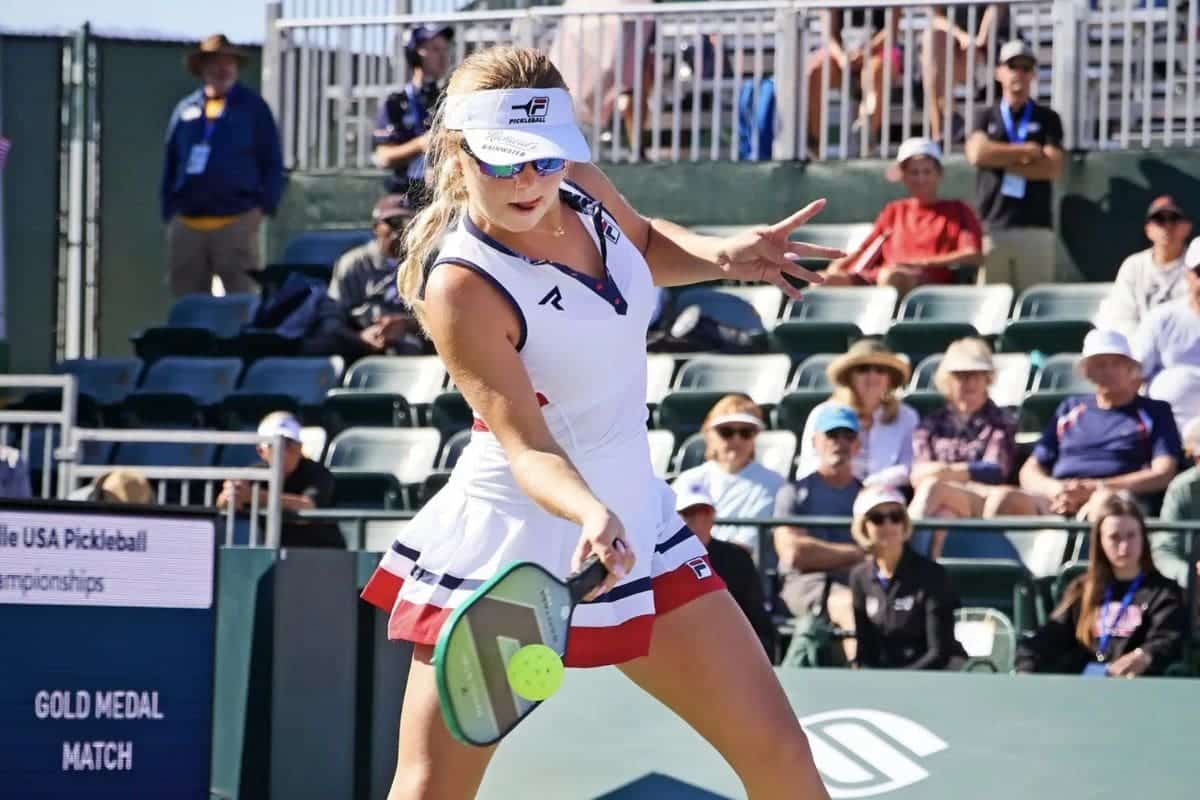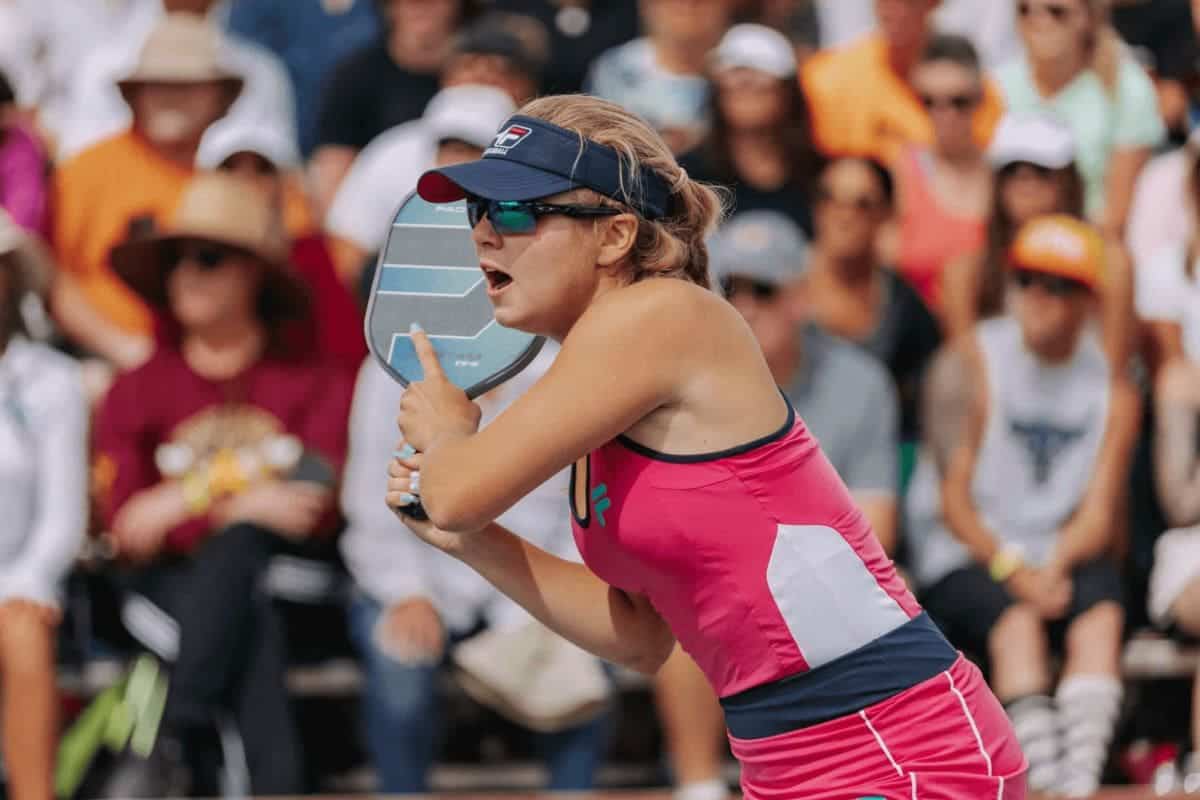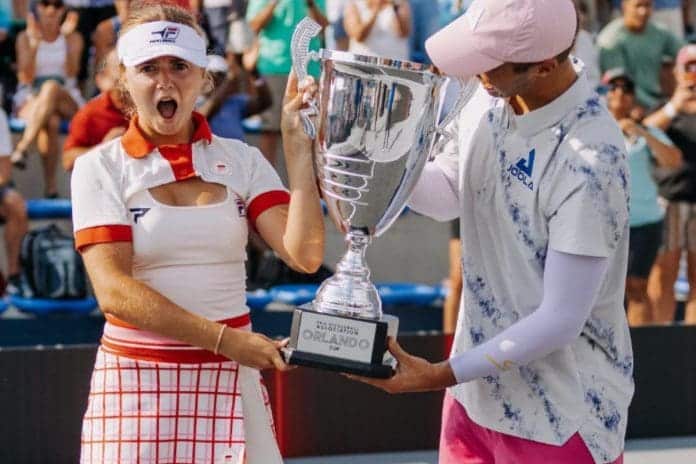Waters Leads Pickleball’s Gender Parity Charge: In the world of professional sports, the focus is increasingly on female athletes, and pickleball is no different. Anna Leigh Waters, currently at the top of the world rankings, represents equality and success in a sport where women’s skills match those of men.
There has been a noticeable excitement around women in sports recently. For example, Caitlin Clark, a standout from college basketball, made her debut in the WNBA and attracted a record-breaking 2.1 million viewers on ESPN. Meanwhile, the University of Oklahoma’s softball team has won their fourth consecutive NCAA Championship, showing their strong position in college sports.
Amid these narratives of success and recognition, Waters’ rise in pro pickleball is noteworthy. Surpassing Ben Johns for the most Triple Crowns in PPA Tour history, Waters has not only redefined excellence on the court but also championed gender equality within the sport.
“Growing up, I was playing soccer, tennis and pickleball, and because I was playing a ton of pickleball, I never really thought about the fact that in some other sports, women weren’t paid equally or weren’t watched as much”–Waters
This parity was clearly evident at the CIBC Texas Open, where FOX extended coverage of the women’s doubles championship match, underscoring the demand and enthusiasm for both men’s and women’s pickleball at the highest level.
“I’m excited for a new generation of girls to grow up into the pickleball world where everybody is treated equally and everybody is paid the same,” Waters emphasizes. “As I get older, I realize that’s not the case in every sport, but hopefully we’re going in the right direction and we’re getting there in every sport.”
The sport is appealing not just for its competitive integrity but also for its inclusive philosophy. Unlike many professional sports leagues where female athletes struggle for recognition, pickleball offers a refreshing contrast. Waters herself has achieved celebrity status comparable to her male counterparts, earning a spot on the Forbes 30 Under 30 list in 2023.
Waters’ journey is inspiring, especially for Junior PPA players, who view her as a pioneer in breaking barriers and setting new standards of excellence. Her success highlights the potential for women’s sports to captivate audiences and earn equal respect in a field traditionally dominated by male athletes.
“I’m very proud to say that my sport is an equal opportunity sport,” Waters concludes. It’s a privilege to compete in a sport where the playing field truly is level.
View this post on Instagram
As pickleball expands worldwide, driven by champions like Anna Leigh Waters, it not only displays thrilling athleticism but also sets a progressive example for the broader sports community. Through every match and achievement, Waters and her peers are leading the charge toward a future where equality in sports is not just a goal but a reality.

Anna Leigh Waters’ statements reflect both her personal experience and a broader perspective on gender equality in sports, particularly within the context of pickleball. Her assertion that she never considered unequal pay or visibility issues in sports like soccer and tennis while deeply immersed in pickleball highlights a common phenomenon where athletes may not fully perceive systemic inequalities until confronted with them directly.
Waters’ optimism about the future of pickleball as an equal-opportunity sport is admirable. She envisions a future where gender parity is not just an ideal but a reality, where young girls can grow up aspiring to compete on equal footing with their male counterparts. This aspiration resonates deeply, especially in a sporting world where disparities in pay, media coverage, and sponsorship opportunities still persist across many disciplines.
Pickleball, in its early stages as a professional sport, seems to be establishing a forward-thinking precedent. Unlike more established sports leagues where female athletes often face challenges in achieving equitable recognition and compensation, pickleball offers a level playing field. The sport’s inclusive philosophy and growing popularity contribute to a supportive environment where both men and women can thrive based on their skill and dedication.
However, it’s crucial to critically examine whether pickleball genuinely serves as a cure-all for gender equality in sports. While Waters’ optimism is inspiring, the sport operates within a larger societal framework where deep-rooted biases and structural inequalities persist. The visibility and opportunities afforded to women in pickleball may not yet mirror those in more mainstream sports.
Moreover, while pickleball may currently champion equality, sustaining this philosophy as the sport grows and commercializes could present challenges. As economic interests and media attention increase, there is a possibility that gender disparities observed in other sports could also appear in pickleball, although perhaps to a lesser degree or in different ways.

Anna Leigh Waters’ efforts to promote gender equality in pickleball are commendable and signify progress within the sport. However, it’s important to consider her statements within a broader context. While pickleball shows promise as a platform for inclusivity and equal opportunity, achieving sustained parity in all sports requires continuous inspection, advocacy, and action to dismantle systemic barriers that impede women’s representation and progress in athletics.
News in Brief: Waters Leads Pickleball’s Gender Parity Charge
Anna Leigh Waters is leading the charge for gender parity in pickleball, where her achievements and visibility are reshaping how women are viewed in sports. By breaking records and receiving accolades such as Forbes 30 Under 30, Waters symbolizes equality and success in a sport that values both men’s and women’s abilities equally. Her influence extends beyond the court, motivating a new generation to embrace pickleball’s inclusive values and strive for equal recognition and compensation in athletics. As pickleball gains worldwide popularity, Waters’ leadership highlights its progressive stance on gender equality in sports.
Also read: Sacramento Open Fashion: Who Stole the Style Spotlight
